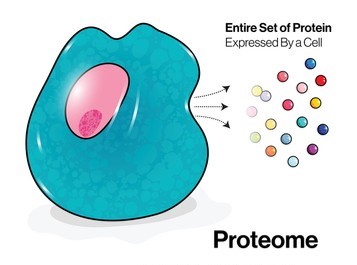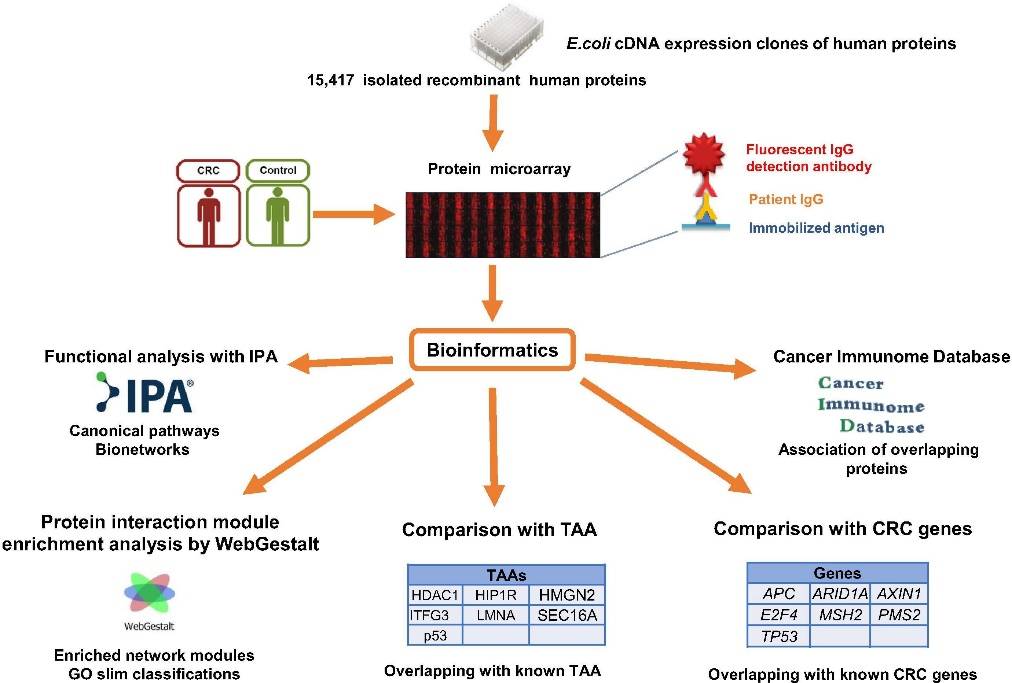Immunomics Services
Immune Cell Proteomics Analysis
The study of the proteome not only provides the material basis for the laws of life activities but also provides the theoretical basis and solutions for the elucidation and conquest of many kinds of disease mechanisms. CD Genomics provides proteomic analysis services for blood, cancer, and other diseased tissues to facilitate our clients' immunomics projects.
Proteomics Analysis Applied to Immunomics Studies
Naturally, the level of protein expression must depend on the level of transcription, but in many cases, the correlation between mRNA and protein expression is poor due to the great variation in protein degradation rates and stability. Therefore, it is increasingly important to study protein profile expression analysis to understand which changes are critical steps in the disease and to reliably predict patient outcomes with or without clinical intervention.
 Fig.1 Diagram of the proteome.
Fig.1 Diagram of the proteome.
- Proteomics Analysis for Colorectal Cancer
Colorectal cancer (CRC) is the second most common cancer in women and the third most common cancer in men worldwide. Characterization of the immunome of CRC and its autoantibody profile from different reactive antigens (DIRAGs) can provide insight into the aberrant cellular mechanisms or enrichment networks associated with the disease. Immunomics analysis on protein microarrays reveals that the immunoproteomic IgG profiles of CRC samples are mainly associated with cell death, survival, and proliferation pathways, particularly proteins involved in EIF2 and mTOR signaling, compared to control samples.
 Fig.2 Procedure overview for CRC
immunome studies. (Coronell, J. A. L., et al., 2018)
Fig.2 Procedure overview for CRC
immunome studies. (Coronell, J. A. L., et al., 2018)
Our Services
Proteins are closely linked to the expression of cellular phenotypes, and the study of proteins can provide concise clues about the behavior and function of immune cells. CD Genomics provides professional and reliable proteomics analysis services to promote the study of immunomics.
Wide Variety of Sample Types
One of the advantages of proteomics analysis in the field of immunomics research is in terms of materials. We can provide reliable proteomics analysis services based on a variety of sample types, including but not limited to the following.

Pathogens
High throughput immunomics is a powerful platform for discovering the antigenic profile of pathogens, especially parasites, providing data for potential targets of immune response and for developing diagnostic tests for infectious diseases.
Multiple Protein Analysis Methods
Our company offers several types of proteomic platforms to meet the different needs of our clients.
- Antibody-based Methods
Techniques such as ELISA (enzyme-linked immunosorbent assay) and Western blotting rely on the availability of antibodies against specific proteins or epitopes to identify proteins and quantify their expression levels. - Gel-based Methods
Two-dimensional gel electrophoresis (2DE or 2D-PAGE) is the first proteomics technique developed, which uses an electric current to separate proteins in a gel based on their charge (first dimension) and mass (second dimension). Differential gel electrophoresis (DIGE) is a modified form of 2DE that uses different fluorescent dyes and allows two to three protein samples to be compared simultaneously on the same gel. - Chromatography-based Methods
Chromatography-based methods can be used to separate and purify proteins from complex biological mixtures, such as ion exchange chromatography to separate proteins based on charge, size exclusion chromatography to separate proteins based on molecular size, and affinity chromatography to exploit reversible interactions between specific affinity ligands and their target proteins, such as purification of IgM and IgA molecules using lectins.
Why Choose Us
As a pioneer in immunomics, CD Genomics has been focused on conducting immunomics-related proteomic studies for many years. Through collaboration and communication with our clients, we have provided solutions for studies that have advanced potential biomarker and mechanistic studies for a variety of diseases. Please contact us for more information.
Reference
- Coronell, J. A. L., Sergelen, K., Hofer, P., Gyurján, I., Brezina, S., Hettegger, P., ... & Weinhäusel, A. (2018). The Immunome of Colon Cancer: functional in Silico Analysis of antigenic proteins deduced from IgG microarray profiling. Genomics, proteomics & bioinformatics, 16(1), 73-84.
